A Conversation with Bruce Duffie
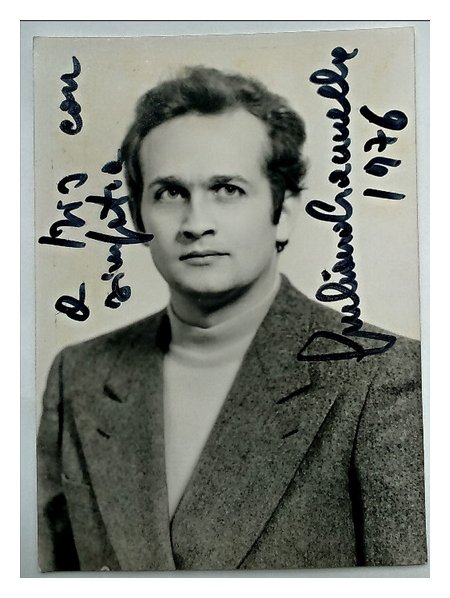

| Giuliano Ciannella (25 October
1943 – 13 January 2008) was an Italian operatic tenor who had a major international
career from the mid-1970s through the late 1990s. He was notably a regular
performer at the Metropolitan Opera in New York City from 1979 through
1986, the Lyric Opera of Chicago between 1982 and 1988 [see box below
for full details], and at the Vienna State Opera from 1985 up until
the end of his career. Ciannella mostly performed roles from the Italian
repertory, particularly excelling in the operas of Giuseppe Verdi and Giacomo
Puccini. Born in Campi Salentina (Lecce), Ciannella initially studied engineering at the University of Bologna until a chance encounter with Mirella Freni led him to his being encouraged towards an opera career. He entered the Bologna Conservatory where he studied under Leone Magiera. After he graduated he continued with further training under Carlo Bergonzi before making his professional opera debut in 1974 at the Teatro Nuovo in Milan as Edgardo in Donizetti's Lucia di Lammermoor. That same year he won the Bussetto international singing competition. He made his first appearance at La Scala in 1976 as Cassio in Verdi's Otello. Over the next three years he had several successes at important opera houses in Italy, including the Teatro Carlo Felice, the Teatro Regio di Parma, and La Fenice. 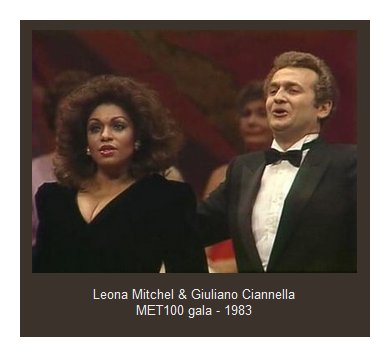 Ciannella joined the roster of principal tenors at the Metropolitan Opera
in 1979, making his first appearance with the company as Alfredo in Verdi's
La traviata opposite Eugenia
Moldoveanu as Violetta in an outdoor concert at Clove Lakes Park, Staten
Island on June 13, 1979. His first performance at the opera house was on
September 24, 1979 as Cassio to Plácido Domingo's Otello and Gilda
Cruz-Romo's Desdemona; a performance which was broadcast live on television.
Cianella made more than one hundred appearances at the Met over the next
nine seasons, with his signature roles at the house being Alfredo, Rodolfo
in Puccini's La Bohème
and the title role in Verdi's Don Carlo.
His other roles with the company included Des Grieux in Puccini's Manon Lescaut, the Italian Singer in
Richard Strauss's Der Rosenkavalier,
Macduff in Verdi's Macbeth,
Manrico in Verdi's Il trovatore,
Pinkerton in Puccini's Madama Butterfly,
and Rinuccio in Puccini's Gianni Schicchi.
He also gave several performances of Verdi's Requiem with the company alongside fellow
soloists Johanna Meier,
James Morris, and Florence
Quivar in 1981. After leaving the Met in 1986, Ciannella returned to
the house only one more time during his career for a 1996 production of
Puccini's Turandot. His final
and 112th performance at the Met was as Prince Calàf to Ruth Falcon's
Turandot on June 14, 1996.
Ciannella joined the roster of principal tenors at the Metropolitan Opera
in 1979, making his first appearance with the company as Alfredo in Verdi's
La traviata opposite Eugenia
Moldoveanu as Violetta in an outdoor concert at Clove Lakes Park, Staten
Island on June 13, 1979. His first performance at the opera house was on
September 24, 1979 as Cassio to Plácido Domingo's Otello and Gilda
Cruz-Romo's Desdemona; a performance which was broadcast live on television.
Cianella made more than one hundred appearances at the Met over the next
nine seasons, with his signature roles at the house being Alfredo, Rodolfo
in Puccini's La Bohème
and the title role in Verdi's Don Carlo.
His other roles with the company included Des Grieux in Puccini's Manon Lescaut, the Italian Singer in
Richard Strauss's Der Rosenkavalier,
Macduff in Verdi's Macbeth,
Manrico in Verdi's Il trovatore,
Pinkerton in Puccini's Madama Butterfly,
and Rinuccio in Puccini's Gianni Schicchi.
He also gave several performances of Verdi's Requiem with the company alongside fellow
soloists Johanna Meier,
James Morris, and Florence
Quivar in 1981. After leaving the Met in 1986, Ciannella returned to
the house only one more time during his career for a 1996 production of
Puccini's Turandot. His final
and 112th performance at the Met was as Prince Calàf to Ruth Falcon's
Turandot on June 14, 1996.Ciannella also performed roles with many other companies internationally during the 1980s and 1990s. He sang frequently at the Vienna State Opera from 1985 up until the end of his career, performing much of the same repertoire he performed at the Met. He notably gave a lauded portrayal of Riccardo in Verdi's Un ballo in maschera in 1990. Ciannella made his debut at the San Francisco Opera in 1984 as Don José in Carmen. He appeared at the Houston Grand Opera for the first time in 1985 in the title role of Gounod's Faust, and that same year made his debut at the Bavarian State Opera in the title role of Verdi's Don Carlo. In 1986 he performed for the first time at the Royal Opera at Covent Garden as Manrico. He appeared in operas at the Arena di Verona during the summers of 1983, 1985 and 1988. In 1987 he sang the title role in Verdi's Ernani at the Bregenzer Festspiele. He sang two roles at the Oper der Stadt Köln during his career, Don José (1988) and Des Grieux (1990). His other performances include appearances with the Deutsche Oper Berlin and the Grand Théâtre de Genève among many others. After retiring from the stage in the late 1990s, Ciannella taught on the voice faculties of the Parma Conservatory and the Ferrara Conservatory. He was still teaching at the time of his death in Ferrara in 2008. |
|
Giuliano Ciannella at Lyric Opera
of Chicago
1982 - Madama Butterfly (Pinkerton) with Mauti-Nunziata, Bruscantini, Zilio, Andreolli, Cook, Del Carlo; Gómez-Martinez,
Prince, Duhnam
Luisa Miller (Rodolfo) with Shade, Brendel, Kavrakos, Washington; Gómez-Martinez, N. Merrill, Colonnello 1983 - La Bohème (Rodolfo) with Cotrubas, Raftery, Washington, Hong, Tajo; Navarro, Copley, Pizzi 1986-87 - La Gioconda (Enzo) with Dimitrova, Welker, Plishka, Dunn/Curry; Bartoletti, Crivelli, Brown 1987-88 - [Opening Night] Il Trovatore (Manrico) with Tomowa-Sintow, Verrett, Nucci/Raftery/Cappuccilli; Bartoletti, Frisell, Benois Tosca (Cavaradossi) with Scotto, Milnes/Nimsgern, Patterson, Andreolli, Tajo; Tilson Thomas, Kellner (Gobbi original), Pizzi |
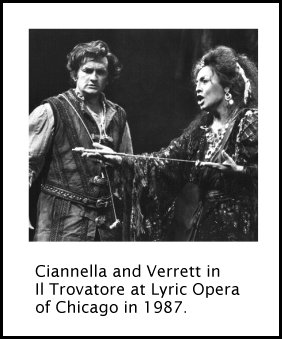 Giuliano Ciannella:
My heart is baritone but my voice is tenor.
Giuliano Ciannella:
My heart is baritone but my voice is tenor.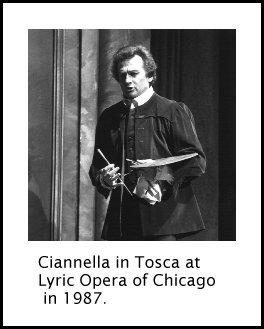 GC:
The material of the set is important. If the setting is made of materials
that absorb sound, it’s no good. It’s better to have a solid piece
of scenery behind you rather than an open space. In America there
are many open-air theaters, and each one has a shell which is the right
shape to project the sound toward the audience. And there are, of
course, theaters in which certain singers sound better and others where
they sound worse. Not every singer sounds the same in all theaters.
GC:
The material of the set is important. If the setting is made of materials
that absorb sound, it’s no good. It’s better to have a solid piece
of scenery behind you rather than an open space. In America there
are many open-air theaters, and each one has a shell which is the right
shape to project the sound toward the audience. And there are, of
course, theaters in which certain singers sound better and others where
they sound worse. Not every singer sounds the same in all theaters.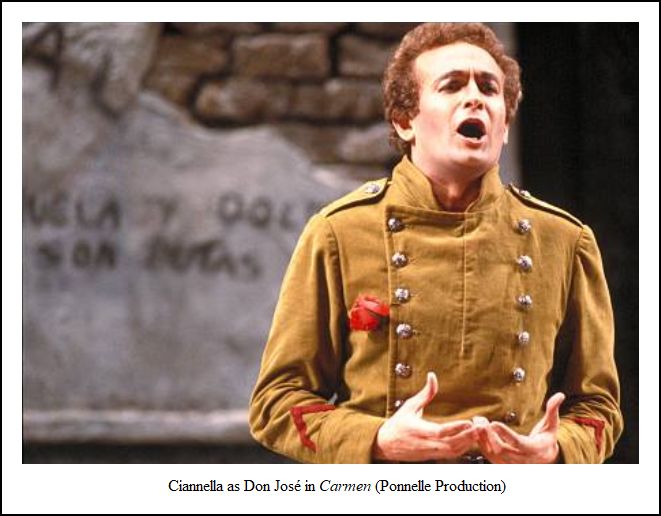 BD: If you are in the audience, would you rather
attend an opera where you don’t sing the role?
BD: If you are in the audience, would you rather
attend an opera where you don’t sing the role?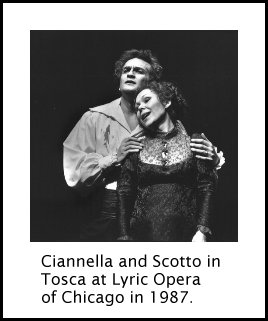 GC:
I have quarreled with many stage directors about this — not
with Hal Prince, but with others. You have to consider the time of
the story. It was permissible for military men at that time to do
what Pinkerton has done — to marry a woman like Cio-Cio-San
without really meaning it. It can be compared to owning a slave,
which we don’t approve of today, but at the time it was acceptable behavior.
So in this context, Pinkerton is not a bad man. He has no bad intentions
toward Butterfly despite the fact that to a modern eye it is very bad.
He takes things very lightly and doesn’t consider the consequences.
GC:
I have quarreled with many stage directors about this — not
with Hal Prince, but with others. You have to consider the time of
the story. It was permissible for military men at that time to do
what Pinkerton has done — to marry a woman like Cio-Cio-San
without really meaning it. It can be compared to owning a slave,
which we don’t approve of today, but at the time it was acceptable behavior.
So in this context, Pinkerton is not a bad man. He has no bad intentions
toward Butterfly despite the fact that to a modern eye it is very bad.
He takes things very lightly and doesn’t consider the consequences.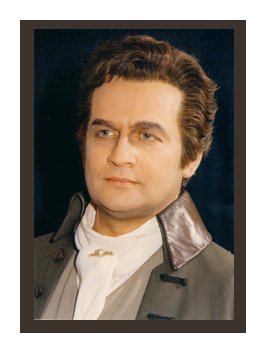 BD:
Is this what sets great composers apart — the ability
to speak to the whole world rather than just to one nation?
BD:
Is this what sets great composers apart — the ability
to speak to the whole world rather than just to one nation?
=======
======= =======
=======
---- ---- ----
======= =======
======= =======
© 1982 Bruce Duffie
This conversation was recorded backstage at the Opera House in Chicago
on December 16, 1982. A transcription was made and much of it was
published in Opera Scene Magazine
in January, 1983. The transcript was re-edited and posted on this
website early in 2016.
To see a full list (with links) of interviews which have been transcribed and posted on this website, click here.
Award - winning broadcaster Bruce Duffie was with WNIB, Classical 97 in Chicago from 1975 until its final moment as a classical station in February of 2001. His interviews have also appeared in various magazines and journals since 1980, and he now continues his broadcast series on WNUR-FM, as well as on Contemporary Classical Internet Radio.
You are invited to visit his website for more information about his work, including selected transcripts of other interviews, plus a full list of his guests. He would also like to call your attention to the photos and information about his grandfather, who was a pioneer in the automotive field more than a century ago. You may also send him E-Mail with comments, questions and suggestions.